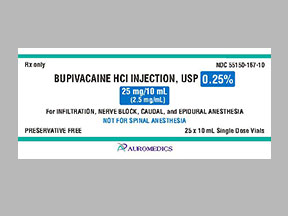
Sensorcaine-mpf Coupons & Savings Card – Discount Prices from $1.01
Brand for: Bupivacaine (pf)
My prescription
Edit
10ML of 0.25%, Bupivacaine (pf) (1 Vial)
Select pharmacy

CVS
$20.37
COUPON PRICE
Walmart
$1.01
COUPON PRICE
Albertsons
$4.54
COUPON PRICE
Walgreens
$4.54
COUPON PRICESensorcaine-mpf savings card
Show this card to your pharmacist
Walmart
$1.01
BIN
ID
PCN
GRP
019876
LH137A38C8
CHIPPO
LHX
Powered by
Sensorcaine-mpf (Bupivacaine (pf)) dosage forms
Dosage Quantity Price from Per unit 10ML of 0.25% 1 Vial $1.01 $1.01 10ML of 0.5% 1 Vial $1.01 $1.01 10ML of 0.5% 2 Vials $1.01 $0.51 10ML of 0.5% 3 Vials $2.21 $0.74 10ML of 0.25% 2 Vials $1.01 $0.51 10ML of 0.25% 3 Vials $1.01 $0.34 10ML of 0.75% 1 Vial $1.01 $1.01 10ML of 0.75% 2 Vials $1.01 $0.51 10ML of 0.75% 3 Vials $1.01 $0.34
| Dosage | Quantity | Price from | Per unit |
|---|---|---|---|
| 10ML of 0.25% | 1 Vial | $1.01 | $1.01 |
| 10ML of 0.5% | 1 Vial | $1.01 | $1.01 |
| 10ML of 0.5% | 2 Vials | $1.01 | $0.51 |
| 10ML of 0.5% | 3 Vials | $2.21 | $0.74 |
| 10ML of 0.25% | 2 Vials | $1.01 | $0.51 |
| 10ML of 0.25% | 3 Vials | $1.01 | $0.34 |
| 10ML of 0.75% | 1 Vial | $1.01 | $1.01 |
| 10ML of 0.75% | 2 Vials | $1.01 | $0.51 |
| 10ML of 0.75% | 3 Vials | $1.01 | $0.34 |
Is Sensorcaine the same as lidocaine?
Sensorcaine is not the same as lidocaine. Sensorcaine is a brand name for bupivacaine, which is a different local anesthetic. Both Sensorcaine (bupivacaine) and lidocaine are used for numbing during procedures, but they have different properties and durations of action.
Is Sensorcaine the same as bupivacaine?
Yes, Sensorcaine is a brand name for the drug bupivacaine. They are the same medication, with Sensorcaine being one of the commercial names under which bupivacaine is marketed.
What are the symptoms of Sensorcaine toxicity?
Symptoms of Sensorcaine (bupivacaine) toxicity can include central nervous system effects such as dizziness, tinnitus, confusion, seizures, and loss of consciousness. Cardiovascular symptoms may include hypotension, bradycardia, arrhythmias, and in severe cases, cardiac arrest. It is important to seek immediate medical attention if toxicity is suspected.
What is the generic name for Sensorcaine?
The generic name for Sensorcaine is bupivacaine.
What does Sensorcaine do?
Sensorcaine is a local anesthetic used to numb a specific area of the body to prevent pain during surgical procedures, dental work, or other medical interventions. It works by blocking nerve signals in the body.
